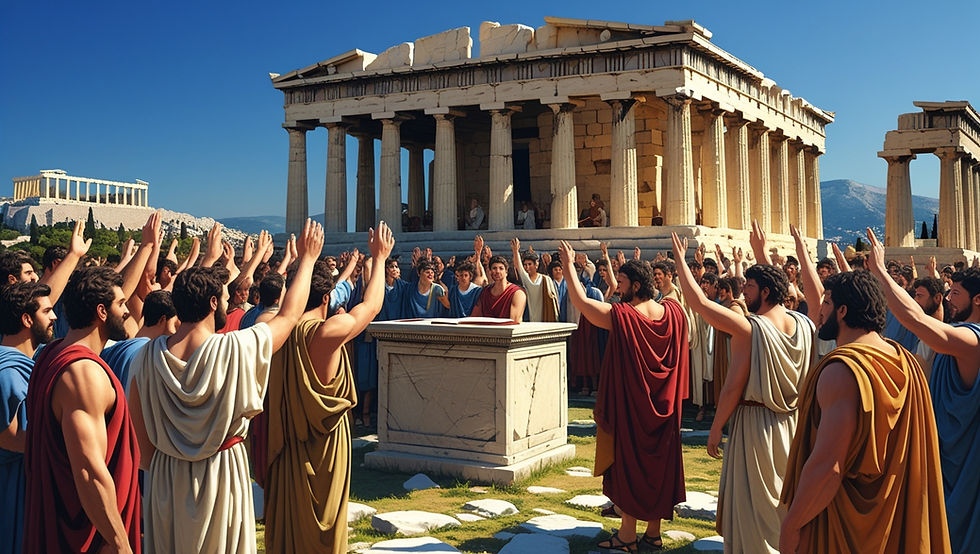Ancient Greece
- Maria Hasan
- May 12
- 3 min read
Updated: May 15
When we think of democracy, we often think of modern political systems. But the roots of democracy trace back to Ancient Greece, particularly to Athens, around the 5th century BCE. The Athenian experiment in democracy laid the foundation for many of the political systems we have today, influencing the way we think about governance and the role of citizens in their government.

What Was Athenian Democracy?
Athenian democracy was radical for its time. Unlike modern representative democracy, where citizens vote for leaders to make decisions on their behalf, Athens practiced a direct democracy. In this system, citizens could vote on laws, policies, and major decisions directly. However, this wasn’t a democracy for everyone. Only free men born in Athens were eligible to participate. Women, slaves, and non-citizens had no political rights, making Athenian democracy limited compared to modern standards.
Key Features of Athenian Democracy
The Assembly (Ekklesia): Every eligible citizen could attend the Assembly, where they voted on laws, military strategy, and major issues such as war and peace. The Assembly was held regularly and could involve thousands of citizens debating and voting.
The Council of 500 (Boule): This group of 500 citizens, selected by lottery, was responsible for managing the daily affairs of the city and proposing legislation. This helped prevent any one group from monopolizing power.
Juries and Courts: Citizens could also serve on juries to decide legal cases. The courts were an important part of Athenian democracy, allowing people to settle disputes and hold public officials accountable.
Public Participation: Unlike today’s systems, where politicians are largely elected to represent their constituencies, Athenian citizens were required to take part in civic duties. This system ensured that every citizen had a voice in public matters.
How Did It Work?
Athens’ democracy was built on the idea that citizens should play an active role in shaping their government. Decisions were made collectively, with citizens taking part in debates and voting on laws. The idea of majority rule was central to the process. This participatory model allowed Athens to be a center of intellectual, artistic, and political life during its Golden Age.
While the system was revolutionary, it was not without flaws. For instance, the exclusion of women, slaves, and foreigners from political participation meant that only a fraction of the population had a direct role in decision-making.
Challenges and Limitations
While Athenian democracy was revolutionary, it had its flaws. Only a small portion of the population had a voice. Slavery was widespread, with many of Athens' public works built by enslaved people. Additionally, women had no political rights and were excluded from voting or public office. Citizenship was also restricted, and only a small minority of the population enjoyed full rights. Despite these limitations, the core idea—that people should have a direct say in their government—remained influential.
Another challenge was the potential for mob rule. In a direct democracy, decisions were often made based on public emotion, and this could sometimes lead to hasty or unpopular decisions. This was seen when Athens voted to execute the philosopher Socrates or when the Assembly decided to invade Sicily, resulting in disastrous consequences.

The Legacy of Athenian Democracy
Although Athenian democracy eventually faded due to political instability, foreign conquest, and internal divisions, its principles lived on. The idea of citizen participation, equality before the law, and freedom of speech became foundational for the development of modern democratic systems. Athens influenced the development of democracy in the Roman Republic, which in turn influenced many of today’s democratic nations, including the United States.
The Athenian model is often considered the foundation of the idea that a government’s legitimacy comes from the will of the people—a principle that still holds true today in countries around the world.
Final Thoughts: Democracy’s Enduring Influence
The democratic experiment in Ancient Greece may have been limited in scope, but its legacy continues to inspire modern political systems. Today, many nations still look back to Ancient Greece as the birthplace of democratic ideals, with Athens serving as a symbol of people-powered governance. While the system was imperfect, the core belief that citizens should have the power to shape their government has endured throughout history.






Comentários